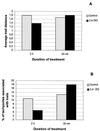Serine protease inhibitors block invasion of host cells by Toxoplasma gondii
- PMID: 10348752
- PMCID: PMC89278
- DOI: 10.1128/AAC.43.6.1358
Serine protease inhibitors block invasion of host cells by Toxoplasma gondii
Abstract
We investigated the effect of protease inhibitors on the asexual development of the protozoan parasite Toxoplasma gondii. Among the inhibitors tested only two irreversible serine protease inhibitors, 3,4-dichloroisocoumarin and 4-(2-aminoethyl)-benzenesulfonyl fluoride, clearly prevented invasion of the host cells by specifically affecting parasite targets in a dose-dependent manner, with 50% inhibitory concentrations between 1 and 5 and 50 and 100 microM, respectively. Neither compound significantly affected parasite morphology, basic metabolism, or gliding motility within the range of the experimental conditions in which inhibition of invasion was demonstrated. No partial invasion was observed, meaning that inhibition occurred at an early stage of the interaction. These results suggest that at least one serine protease of the parasite is involved in the invasive process of T. gondii.
Figures




References
-
- Adams J H, Bushell G R. The effect of protease inhibitors on Eimeria vermiformis invasion of cultured cells. Int J Parasitol. 1988;18:683–685. - PubMed
-
- Berridge M V, Tan A S, McCoy K D, Wang R. The biochemical and cellular basis of the cell proliferation assays that use tetrazolium salts. Biochemica. 1996;4:15–20.
-
- Choi W Y, Nam H W, Youn J H. Characterization of proteases of Toxoplasma gondii. Korean J Parasitol. 1989;27:161–170. - PubMed
-
- Couvreur G, Sadak A, Fortier B, Dubremetz J F. Surface antigens of Toxoplasma gondii. Parasitology. 1988;97:1–10. - PubMed
Publication types
MeSH terms
Substances
LinkOut - more resources
Full Text Sources

